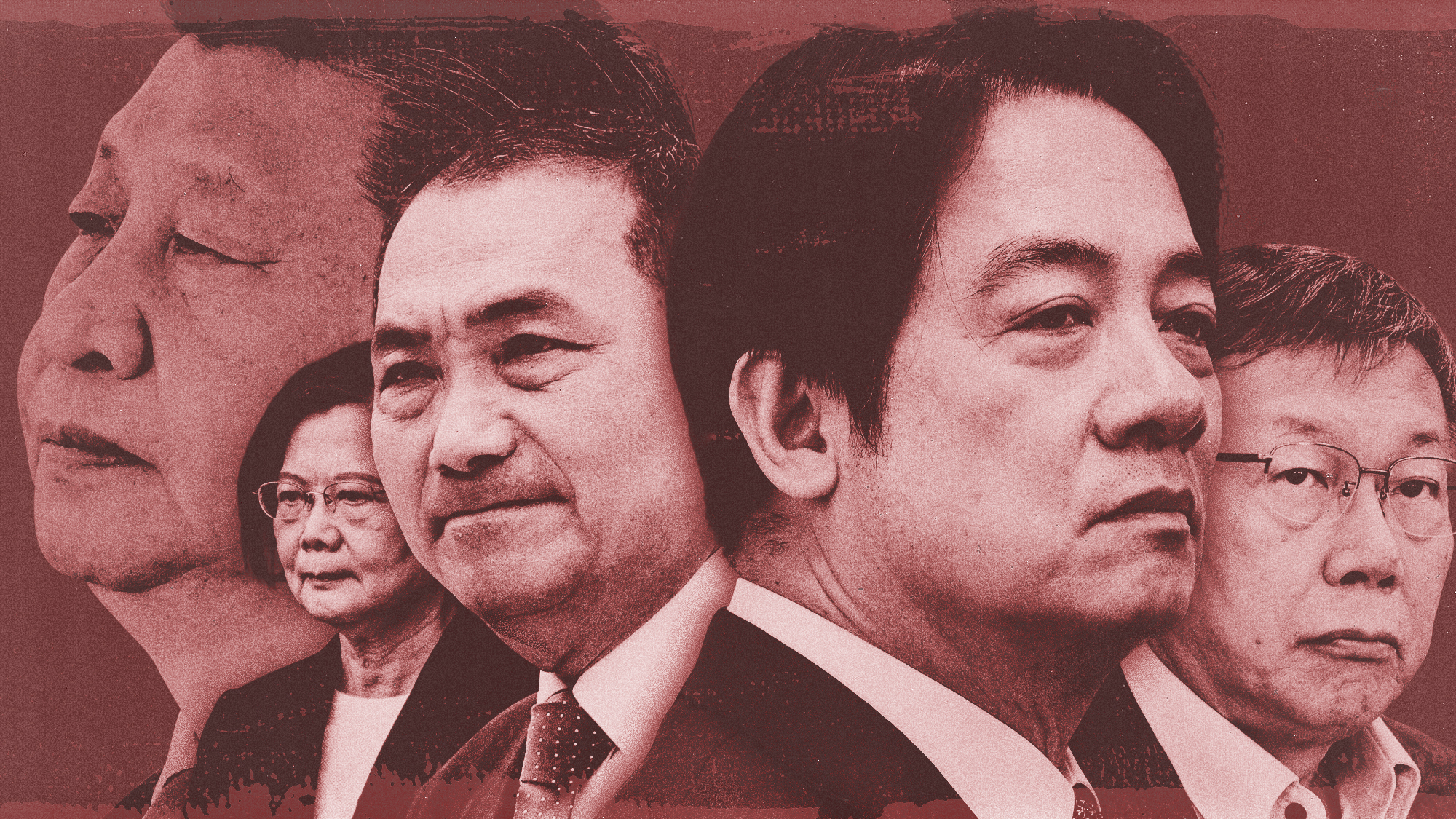What will Taiwan's election mean for its relationship with China?
The outcome of the vote to choose new Taiwanese president will have major implications for domestic and global politics

A free daily email with the biggest news stories of the day – and the best features from TheWeek.com
You are now subscribed
Your newsletter sign-up was successful
Nations worldwide will be watching as Taiwan goes to the polls for a presidential election on 13 January.
The current president, Tsai Ing-wen of the Democratic Progressive Party (DPP), must step down after completing two terms, and who succeeds her will have major implications for both domestic and global politics.
The overarching issue remains China's claim of sovereignty over the island and its 23.5 million population, something all the "major parties running for president reject", said The Guardian. But there are "key differences between them" and the relationship they would form with Beijing, "which could lead to vastly different climates" in the coming year.
The Week
Escape your echo chamber. Get the facts behind the news, plus analysis from multiple perspectives.

Sign up for The Week's Free Newsletters
From our morning news briefing to a weekly Good News Newsletter, get the best of The Week delivered directly to your inbox.
From our morning news briefing to a weekly Good News Newsletter, get the best of The Week delivered directly to your inbox.
What the papers said
The election will determine Taiwan's "cross-strait policy for the next four years", said the BBC's Yvette Tan, and comes amid "ramped-up military pressure" from Beijing. This was summed up in President Xi Jinping's annual New Year's Eve address, in which he said the island would "surely be reunified" with China.
For the Chinese government, the "priority" is to ensure the ruling DPP is "kicked out of office", said The Guardian. The party and President Tsai have "bolstered cooperation" with the US, said Al Jazeera, and welcomed numerous American politicians to the island.
Her potential successor, Vice President Lai Ching-te, who has also visited the US, is likely to continue this trend and could "further distance Taiwan from Beijing". He is the current favourite to win the election, and a victory for him could "rankle" Xi's government and increase pressure in the form of military activities around the island.
Beijing sees the DPP as a "radical separatist group", said The Economist, and has sought to influence Taiwanese citizens and be seen "as a liberator, not an invader". Opposition parties have also claimed the DPP is "trying to stamp out Chinese culture" and "de-sinicise" school students. Anger has been stoked by viral footage of a teacher of Chinese literature in Taipei accusing the government of cracking down on the "classical Chinese texts in the high-school curriculum".
A free daily email with the biggest news stories of the day – and the best features from TheWeek.com
The DPP currently leads the polls, but remains only just ahead of the "Beijing-friendly Kuomintang (KMT)", said Politico. The KMT is keen to "shake off a reputation of being reflexively pro-China" but wants to maintain an "accommodating relationship" that will potentially lead to better prospects for Taiwan. It accuses the DPP of "widening distrust" due to its frosty relationship with Beijing.
The KMT's candidate for the election, Hou Yu-ih, has said a vote for him is a "vote for peace over war", with Beijing saying the same.
Meanwhile, Ko Wen-je of the Taiwan People's Party is running on the "largely undefined" middle ground, claiming he would "be better at talking to both the US and China" and would improve Taiwan's defences.
What next?
Foreign Minister Joseph Wu has said that Taiwan is documenting China's alleged attempts to interfere in the election and will publish its analysis soon after the vote.
"Should China succeed in shaping the outcome of voting in Taiwan, it will apply the same tactics to other democracies to promote its preferred international order," Wu wrote in an article in The Economist.
He urged international observers to pay more attention to China's efforts to undermine Taiwan's democracy through influence and disinformation campaigns, as well as cyberattacks.
No matter the outcome of the election, the US will "stress the need for dialogue and avoiding military confrontation" with Beijing, said Al Jazeera. Joe Biden has verbally committed that the "US would defend Taiwan" in an instance of military conflict with Beijing, but has likewise made comments to "reiterate" the "status quo".
It has led to Taiwanese citizens "asking questions about US commitment" in the event of war, with a sense that trust in its Western ally has "declined", potentially pushing voters towards favouring a more cooperative approach with Beijing. Either way, it leaves the Taiwanese people firmly "in the crosshairs of two superpowers”.
Richard Windsor is a freelance writer for The Week Digital. He began his journalism career writing about politics and sport while studying at the University of Southampton. He then worked across various football publications before specialising in cycling for almost nine years, covering major races including the Tour de France and interviewing some of the sport’s top riders. He led Cycling Weekly’s digital platforms as editor for seven of those years, helping to transform the publication into the UK’s largest cycling website. He now works as a freelance writer, editor and consultant.
-
 Tourangelle-style pork with prunes recipe
Tourangelle-style pork with prunes recipeThe Week Recommends This traditional, rustic dish is a French classic
-
 The Epstein files: glimpses of a deeply disturbing world
The Epstein files: glimpses of a deeply disturbing worldIn the Spotlight Trove of released documents paint a picture of depravity and privilege in which men hold the cards, and women are powerless or peripheral
-
 Jeff Bezos: cutting the legs off The Washington Post
Jeff Bezos: cutting the legs off The Washington PostIn the Spotlight A stalwart of American journalism is a shadow of itself after swingeing cuts by its billionaire owner
-
 The fall of the generals: China’s military purge
The fall of the generals: China’s military purgeIn the Spotlight Xi Jinping’s extraordinary removal of senior general proves that no-one is safe from anti-corruption drive that has investigated millions
-
 Epstein files topple law CEO, roil UK government
Epstein files topple law CEO, roil UK governmentSpeed Read Peter Mandelson, Britain’s former ambassador to the US, is caught up in the scandal
-
 Iran and US prepare to meet after skirmishes
Iran and US prepare to meet after skirmishesSpeed Read The incident comes amid heightened tensions in the Middle East
-
 EU and India clinch trade pact amid US tariff war
EU and India clinch trade pact amid US tariff warSpeed Read The agreement will slash tariffs on most goods over the next decade
-
 Israel retrieves final hostage’s body from Gaza
Israel retrieves final hostage’s body from GazaSpeed Read The 24-year-old police officer was killed during the initial Hamas attack
-
 China’s Xi targets top general in growing purge
China’s Xi targets top general in growing purgeSpeed Read Zhang Youxia is being investigated over ‘grave violations’ of the law
-
 Panama and Canada are negotiating over a crucial copper mine
Panama and Canada are negotiating over a crucial copper mineIn the Spotlight Panama is set to make a final decision on the mine this summer
-
 The app that checks if you are dead
The app that checks if you are deadIn The Spotlight Viral app cashing in on number of people living alone in China